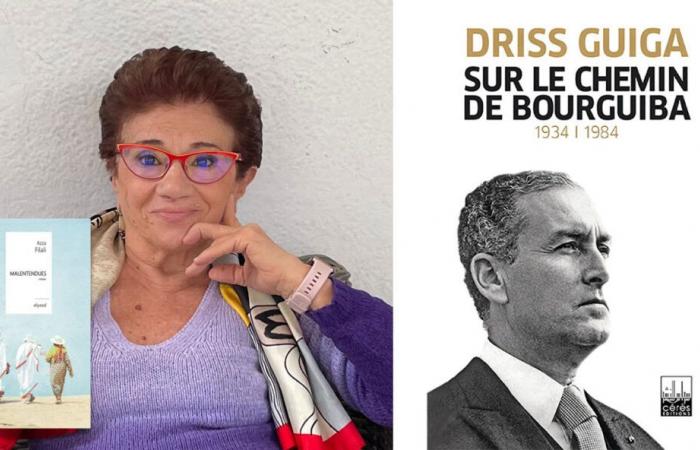Tunisians opt for gripping intrigues as for historical books. Novels inspired by significant events of the past, whether ancient or more recent, are very successful as they allow readers to understand the social, political and human issues that have shaped the modern world.
The Press — The year 2024 was rich in literary events between prestigious prizes, book fairs and meetings with essential authors. From poignant novels to hard-hitting essays, several books published this year have captured readers’ attention. Hailed by critics in Tunisia and abroad, they will undoubtedly continue to resonate for a long time. Here’s a roundup of the books that won awards and the 2024 literary trends confirmed by sales figures.
Overview of the main literary prizes awarded this year
Which books have most won over the juries of the various literary prizes in 2024? We’ve taken stock for you! A look back at the talented winners and their works.
Zoubeida Bchir Prize for
Tunisian women’s writings
The prize for literary creation in the Arabic language was awarded to Najet Eddahen. Ferial Simnouli won the prize for literary creation in the French language.
Prix Comar 2024:
The Golden Comar was awarded to Azza Filali for “Misunderstandings” and Sahbi Karaani for “The Djilani Ben Hmed File”. Wafa Ghorbel and Kalthoum Ayachia received the Special Jury Prize respectively for “Fleurir” and “Histoire des ombres qui tripents”. The Discovery Prize was awarded to “So that the weather is more beautiful” by Atef Gadhoumi and “Arch el majanin” (The reign of fools) by Chaker Nasef.
Price of the 38e edition
of the International Fair
from the book of Tunis:
The Béchir Kheraief Prize (Novel) was awarded to Rayhan Bouzguenda for his novel “Al Mansi fel Hikaya” (The Forgotten in History). The Mustapha Kheraief Prize (poetry) was awarded to Fethi Nasri for his collection “Al Moallaqa and other poems”. Emna Rmili won the Ali Douagi (Short Story) Prize for her collection of short stories “Jiaan” (Hungry). The Fatma Haddad Prize (Philosophical Studies) was awarded in a tie “Nietzsche, al faylasouf al-sarih” (Nietzche, the outspoken philosopher) by Abou Mayara Ezzeddine and Jamal Eddine Al-Afghani, the call to modernity by Omar Cherni. Nejla Kbaïr won the Tahar Haddad Prize (Literary Research and Humanities Studies) for her work “Art and artificial intelligence”. The Sadok Mazigh Prize (translation from and into Arabic) was awarded to Fethi Belhaj Yahia.
Prix d’encouragement
from the State to literary and scientific production:
For the literary creation section, the National Short Story Prize went to Balkis Khlifa for his collection of short stories “Mayta Mobtakara” (An original death) and the National Novel Prize was awarded to Samy Mokaddem for his novel “There Was Twice the Little Prince”.
Literature Prize
Abdelwaheb Ben Ayed
for the year 2024:
FABA awarded 6 awards:
“Beautiful book” prize: “Tunisia and the sea”, by Mohamed Salah Bettaieb, Brahim Chabbouh, Ameur Oueslati and Viviane Bettaieb, Prize for best collection of poetry in Arabic: “So as not to disturb public order” by Amama Zayer, Prize for best essay in Arabic or French: “Palestine and the wars of media defamation by Sahraoui Gamoun, Prize for best novel or short story in French: “Paris is a debt” by Saber Mansouri and Prize for best novel or short story in Arabic: “Sol chaud” by Amira Ghenim
These Tunisians
who shone abroad
Azza Filali received the Ivoire Prize for African literature of French-speaking expression 2024 for her novel “Malconnexions”. The 2024 Arab Literature Prize, sponsored by the Jean-Luc Lagardère Foundation and the Institut du Monde Arabe (IMA), was awarded to Tunisian author Amira Ghenim for her novel “The Disaster of the House of Notables” translated from Arabic by Souad Labbize. The First Prize of the fourth edition of the Sharjah Prize for Arab Poetry Criticism in the United Arab Emirates was awarded to Tunisian poet and academic Fethi Nasri for his study in Arabic on autobiographies in contemporary Arabic poetry. The Abdulaziz Saud Al-Babtain Foundation for Poetic Creativity presented the Prize for Poetic Creativity in Criticism to Ahmed Joua.
What books have Tunisians read in 2024?
Whether it is fiction, autobiographies, classics or new releases, the variety of genres and styles makes literature an activity that is still so appreciated among us. According to the Cérès Diffusion ranking, the top 5 best sellers for books from Tunisian editions include “On the Path to Bourguiba” by Driss Guiga at the top of the list, followed by “Misunderstandings” by Azza Filali, “Idmen” by Faten Fazaa, “History of Tunisia” by Habib Boularès and “Trab skhoun” by Amira Ghenim. For imported books, we retain on the podium “Houris” by Kamel Daoud, winner of the 2024 Prix Goncourt which has sparked a controversy since the announcement of the results, followed by his compatriot Yasmina Khadra with her latest title “Cœur d’amende et Palestine : a people who do not want to die” by Alain Gresh. “Never Again” by Colleen Hoover and “The Knife” by Salman Rushdie occupy fourth and fifth place respectively in sales figures. According to the Al Kitab bookstore, the bestseller list includes two titles by Faten Fazaa, Idmane and “Kafichanta”, a book by Hedi Timoumi “Kayfa sara Tounissioun Tounissyin” (How Tunisians became Tunisians), “La Table du North” by Malek Labidi, “Misunderstandings” by Azza Filali as well as two novels by Amira Ghenim, “Nazilat Dar al akabir” and “Trab skhoun. We cannot therefore conclude that particular genres are popular. Tunisians opt for gripping intrigues as well as historical books. Novels inspired by significant events of the past, whether ancient or more recent, are very successful as they allow readers to understand the social, political and human issues that have shaped the modern world. At the same time, contemporary stories that combine personal reflection and social criticism seem to resonate deeply with an audience hungry for meaning and understanding of their times.






